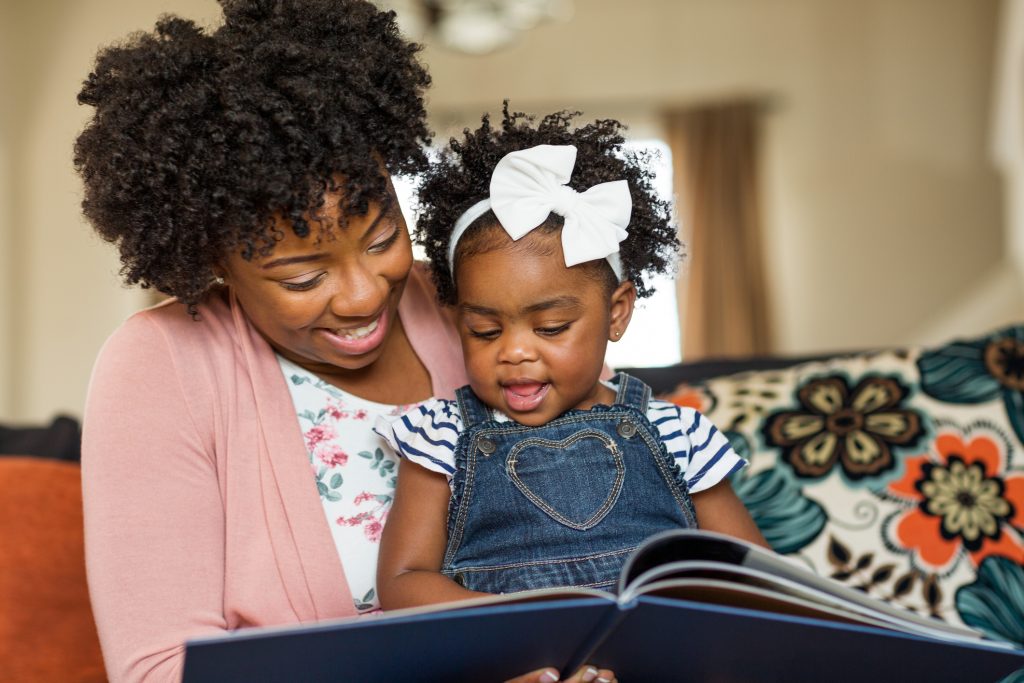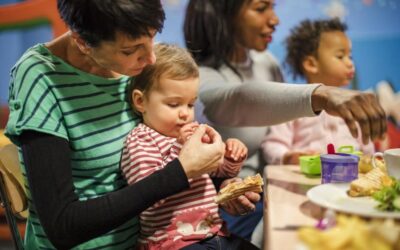Make reading fun from an early age by encouraging literacy with pre-reading activities
Young children learn a lot through stories; emotions, values, cause and effect, basic life lessons, and humor are all topics covered in books. Create an appreciation for reading in children and storytelling by making reading a part of a routine from birth. Not only is it good for a baby’s intellectual development, it’s a nice time to establish a daily schedule that includes quiet and engaging time spent together.
You can encourage the development of additional pre-reading and pre-writing skills by focusing on four core elements of early literacy as you interact with a young child.
Interest in books
Creating an interest in books from an early age is essential to fostering an appreciation of literacy. Develop positive connections with books by making them readily available, including them in your daily routine via reading aloud, and by introducing them as entertainment by participating in outings such as story time at your local library or bookstore.
Related activities:
- Involve the child by allowing them to select the book and turn the pages
- Invite children to sit in your lap and give them undivided attention while reading
- Narrate the story using a puppet or stuffed animal
- Use an animated voice and noises as you read aloud
- Set a good example by making it clear that you enjoy reading for fun
Words are all around us
Words are all around us; not just in books. Associating printed words with meaning and purpose is key to developing lasting literacy skills, as is knowing how to handle a book and how to follow the patterns words make. Point out words you see out in the world and explain what they mean to help establish awareness.
Related activities:
- Follow the words you’re reading out loud with your finger when sharing books
- Teach each child what their name looks like
- Read signs, common words, and product labels as you’re out and about
- Label common items in your program to establish familiarity with letters, words, and objects
Understanding sounds
Knowing the sounds each letter makes and how those work together to form words is one of the building blocks to being able to read. Hearing and recognizing smaller sounds within a word is also an important part of phonological, or speech pattern and sound awareness. As you teach young children the alphabet, point out the sounds each letter makes.
Related activities:
- Clap out syllables of various words
- Recite nursery rhymes repeatedly so children memorize the words and patterns within them
- Tell children what letter their name starts with, and help identify words that start with the same sound
Vocabulary development
The more words children are exposed to, the more they’ll have the ability to recognize. Building vocabulary is as important to early literacy as it is to speech development. Try to help children learn new words and their uses.
Related activities:
- Starting from infancy, narrate your actions. Explain what you’re doing and why.
- Use magnetic letters to make and change words.
- Describe objects or activities by using descriptive words, such as, “This red apple is crunchy and sweet.”
Many everyday activities serve as early exploration of literacy. Babies and young toddlers benefit from handling books, hearing stories and nursery rhymes, and being spoken to about a wide range of subjects. Demonstrate an appreciation of words and books to instill a love of reading in your young child.
The Virginia Infant & Toddler Specialist Network helps improve the quality of care for infants and toddlers through extensive resources, services, and education for caregivers. Learn more about how we can help you improve the standard of care.




